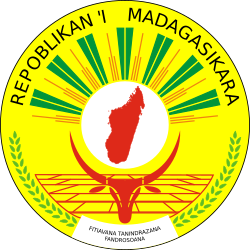| | ||||||||||||||||||||||||||||||||||||||||||||||||||
| ||||||||||||||||||||||||||||||||||||||||||||||||||
All 151 seats in the National Assembly 76 seats needed for a majority | ||||||||||||||||||||||||||||||||||||||||||||||||||
| Turnout | 40.98% | |||||||||||||||||||||||||||||||||||||||||||||||||
|---|---|---|---|---|---|---|---|---|---|---|---|---|---|---|---|---|---|---|---|---|---|---|---|---|---|---|---|---|---|---|---|---|---|---|---|---|---|---|---|---|---|---|---|---|---|---|---|---|---|---|
This lists parties that won seats. See the complete results below.
| ||||||||||||||||||||||||||||||||||||||||||||||||||
 |
|---|
Parliamentary elections were held in Madagascar on 27 May 2019 to elect the 151 members of the National Assembly. [1] They followed presidential elections held in November and December 2018, which saw Andry Rajoelina return to power as President of Madagascar after defeating Marc Ravalomanana in a runoff.
Contents
The result was a decisive victory for Young Malagasies Determined, which won 84 of the 151 seats, allowing them to form a majority government, replacing the previous coalition government formed after the previous elections. The opposition party Tiako i Madagasikara (TIM), led by Marc Ravalomanana won 16 seats, while five small parties secured one seat each. Independent candidates also performed strongly, winning 46 seats.
